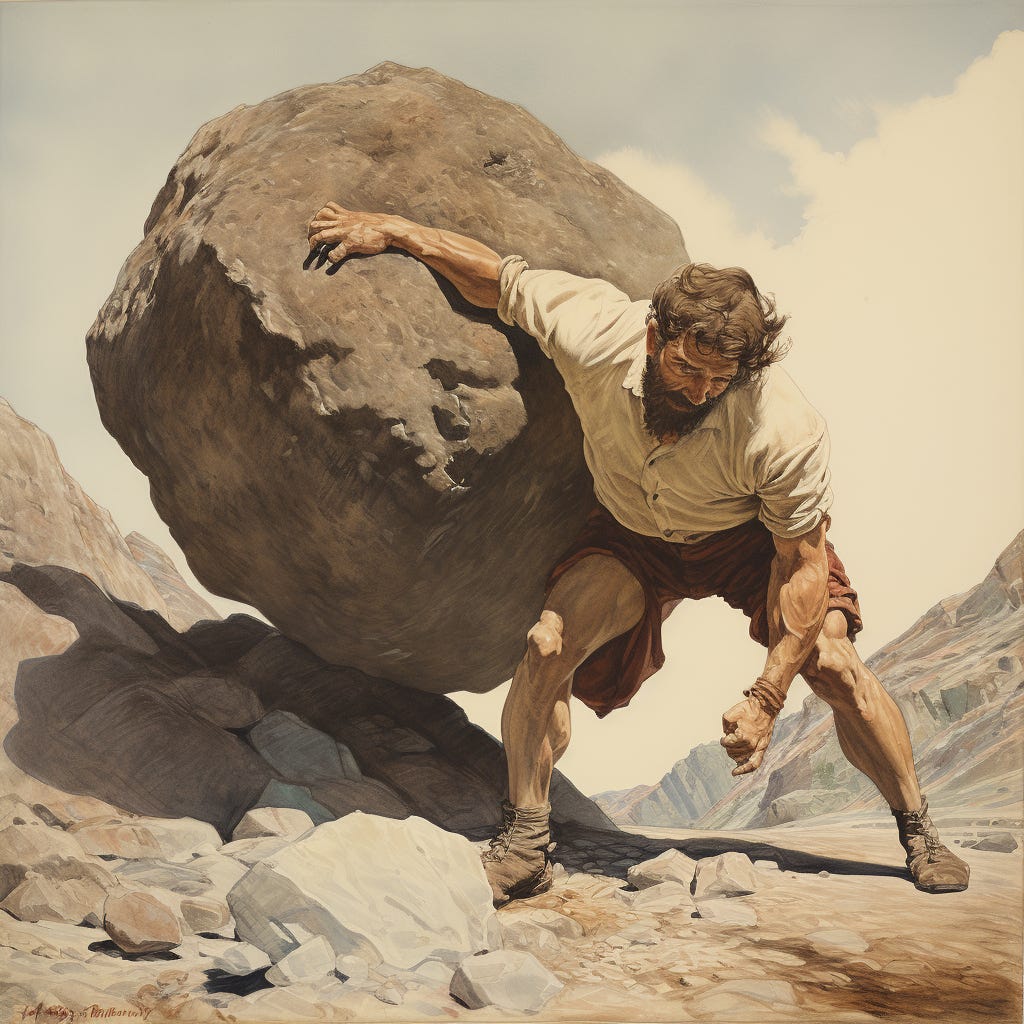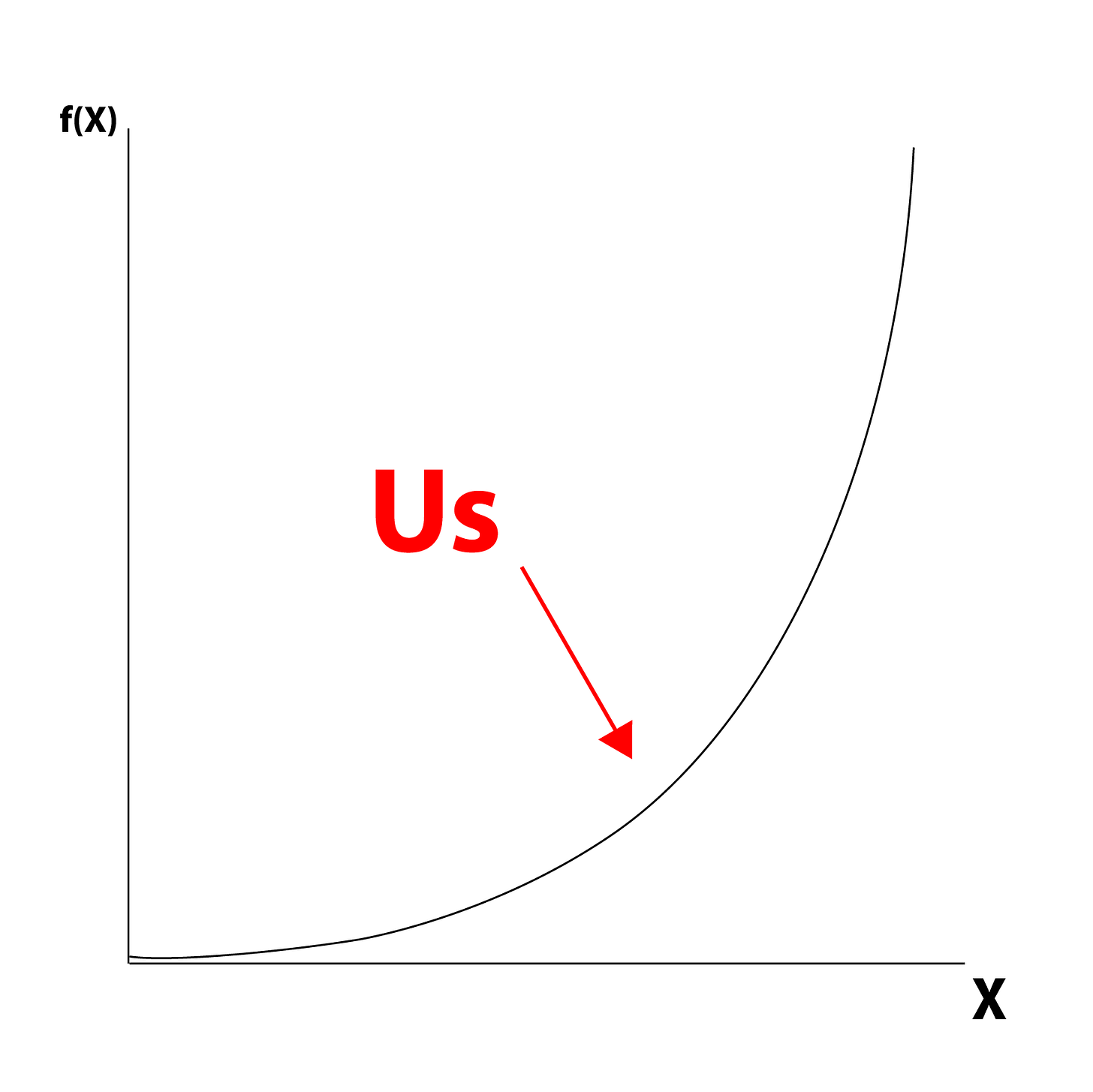What I Learned: Don't Let AI Knock You Off Course
Could AI's ascent help us reshape modern notions of self-worth?
Introduction
The release of ChatGPT in November 2022 marked a pivotal moment in the advancement of AI. In just a few short months, this technology went from highly niche to being used by millions worldwide. Other AI capabilities in generative art, code generation, and more have also rapidly emerged. But, the incredible pace of progress also raises questions about how AI may transform our future, particularly in areas like work, education, and leisure.
There has been no shortage of experts and commentators alike shouting extremist predictions from the metaphorical rooftop of social media - forecasts ranging from genocidal AI to an imminent, utopian, post-scarcity world enabled by superintelligent machines. While these ideas are thought-provoking, recently I've been intrigued by a more subtle, personal feeling that seems to have emerged in the wake of AI's meteoric rise: a creeping sense of existential dread and demotivation towards self-improvement.
If AI is destined to outperform humans at any valuable task, what's the point of honing our own skills and knowledge? Why spend endless hours in deliberate practice when specialized AI can do it better, faster, and cheaper? The looming prospect of human redundancy begs the question of whether our efforts hold inherent value at all, inducing a sort of AI-powered nihilism. It is for those with these feeling that I have written this article.
In it, I aim to examine the origins of this dread, assess where AI currently stands, and suggest reframing our perspective to overcome the cloud of existential unease. The goal is to emerge with a viewpoint preserving the value of self-cultivation despite the possibility of an AI march towards superintelligence.
Where We Currently Are, Or Might Be
First, let's take a breath and remember that as of now, AI does not outperform humans in most areas. Yes, in some narrowly defined tasks AI has surpassed us. But when it comes to broad, general capabilities, humans still hold the upper hand.
As for the pace of AI development, it’s been steep so far, giving the illusion of an unstoppable exponential curve. However, as I was reminded by a YouTube video by David Shapiro, the current trajectory might also resemble a sigmoid curve.
For those unaware, a sigmoid curve, or S-curve, looks a lot like an exponential curve, until it doesn’t. It rounds off and growth slows. The outcome is considerably different, yet at the inflection point the future looks identical. It's plausible AI advancement encounters unforeseen barriers, levelling off into more incremental gains after today's initial breakout.
So for now, any anxiety about machine super-intelligence eclipsing humanity stems more from speculation than reality. Nonetheless, billions of dollars are now being poured into research on the topic, and if I was betting man, I would not feel confident betting against further breakthroughs.
The Philosophy of Self-Development Amidst AI Progress
I think, delving into the root of any existential dread surrounding AI leads us to the concept of utility.
The question we're grappling with — whether there is any point to pursuing self-development if AI can do everything better, faster and cheaper — is framed within a post-industrial revolution mindset that prioritizes economic utility as the primary value of human activity. But should economics be our only lens for assessing philosophical dilemmas?
Perhaps we're overlooking other virtues or qualities inherent to the human experience that enrich life. Could the lens of modern economics, prompting feelings of AI-induced nihilism, be obscuring wisdom from our past?
Insights from Aristotle & Nietzsche
Consider the concept of ‘Arete’, a philosophical principal to the ancient Greeks. It represented the ideal of fulfilling one's potential, of becoming the best version of oneself through self-actualization. In fact, 'Arete' doesn't merely pertain to acquiring skills or knowledge; instead, it focuses on the holistic development of the individual, including virtues like courage, wisdom, and justice.
Aristotle further expanded on these ideas through his notion of 'Eudaimonia', often translated as 'flourishing' or 'the highest human good'. For him, it represented the end-goal - a sustained state of well-being and fulfillment.
Eudaimonia focused on actualizing human potential to achieve excellence, not contingent on outperforming others. Developing our capabilities was valuable inherently, not just economically.
A few thousand years later, Friedrich Nietzche had a similar idea. In his book “Thus Spoke Zarathustra”, he advocated for the idea of “self-overcoming” - transcending oneself through discipline and willpower. Again, self-actualization was not a means to an end, but the end in itself. The struggle is the reason.
Perhaps viewed this way, self-improvement remains worthwhile even if AI surpasses human skillsets. After all, do we care if a car is faster than an Olympic sprinter? The journey of growth itself brings purpose and enjoyment regardless of the destination. We need not measure ourselves against artificial benchmarks to find value in the realization of potential.
The Journey of Self-Cultivation
Aristotle conceived of eudaimonia as human flourishing achieved by acting virtuously and rationally. Developing knowledge and character was central to this self-realization.
Critically, eudaimonia did not depend on exceptional achievement or comparing oneself to others. The merit was in the cultivation itself, not relative superiority. Practical wisdom and moral virtue had inherent worth and brought happiness through balance and excellence.
Nietzsche argued we must move beyond mere contentment, relentlessly pursuing self-overcoming instead. Rather than achieving tranquility, we should summon all our power and push ourselves through discomfort to grow stronger. Life was not about arriving at a destination but revelling in the struggle.
Taken together, these perspectives imply self-cultivation has inherent value, separate from outcomes like career success. We need not measure ourselves against AI benchmarks, or anyone else for that matter. Rather than inducing existential dread, AI's rise could instead offer us an opportunity to reshape our modern conceptions of self-worth and self-cultivation.
Conclusion
Pursuing knowledge, character, and abilities remains meaningful despite AI's capabilities because humans inherently value self-actualization. We craft our identities and find purpose through growth.
Rather than inducing existential dread, AI's rise could reorient us to more philosophical conceptions of self-cultivation. We may rediscover the joy of learning for its own sake rather than economic utility.
In this light, fulfillment comes not from exceeding artificial intelligences, but from exploring our human potential. AI enables us to unburden ourselves from impressing others and focus instead on enjoyment of the climb itself. Finally, for all of us, the journey can eclipse the destination.




